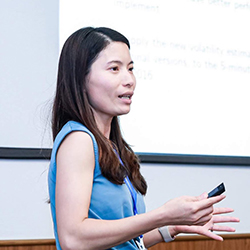
PhD (2011)
Shuping is a professor at Macquarie University. Before joining Macquarie University, she received her PhD from CBE and worked as a lecturer at ANU from 2011 to 2014.
Shuping is an econometrician with a theoretically grounded and policy-relevant research agenda in the field of financial econometrics and applied economics. Her work has been published in top-tier academic journals, including the Journal of Econometrics, International Economic Review, Econometric Theory, and Journal of Financial Econometrics.
She is also one of the developers of the PSY technique, a real-time bubble monitoring technique used by many institutions around the globe.
Over the past few years, Shuping has received over A$1 million of external research funding. This includes the Australian Research Council Discovery Early Career Researcher Award (2019-2021) and two Australian Research Council Discovery Project Awards (2015-2018 and 2019-2021).
15 OCTOBER 2021
Why did you choose to work in academia rather than in industry?
I have always been passionate about research and enjoy challenging myself. Academic work provides the perfect environment for both, with the freedom to choose research topics and the challenges of solving complex problems.
What qualities are your university looking for when hiring a new PhD graduate in your discipline?
The main qualities are:
- Demonstrated work on policy and empirical relevant research questions with strong theoretical support.
- Active engagement with the international research communities, which includes high-quality conference presentations and research visits.
- Excellent presentation and communication skills.
How do you manage multiple deadlines?
The two keywords for me are prioritisation and discipline. It is also very important to look after yourself, especially when you are under stress. Academic work is like running a marathon. Without physical and mental health, you won’t be able to get to the finish line.
What are your tips for producing successful publications in your discipline?
- Present your paper at various conferences, workshops, and seminars. Take all comments received seriously and try your best to address them.
- Never send a rejected paper without any revision to a different journal. Take the opportunity to make your paper stronger.
